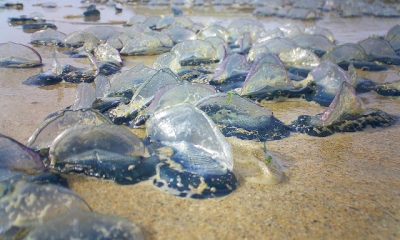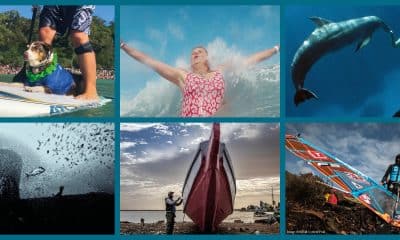News
Marine Conservation Society reveals how wet wipes turn nasty when you flush them

400% rise in wipes on beaches is putting marine life at risk – and pushing up your bills
We all love a wet wipe! Wipe the baby’s bum, get rid of the make-up and cleanse, slap on the fake tan –our bathrooms are full of them. But instead of ending up in the bin when they’re finished with – millions are being popped down the pan because of consumer confusion.
That’s because some are labelled flushable, some biodegradable and some need you to read every bit of the small print which most of us can’t be bothered to do. But the truth is, even those labelled flushable are failing to meet the water industry standard, just adding to the nightmare.
The Marine Conservation Society (MCS) has today launched a campaign to persuade retailers and manufacturers to clearly label their wet wipe products with a ‘DON’T FLUSH’ message on their packaging so they go in the bin, not down the loo.
“Our sewerage systems weren’t built to cope with wet wipes. When flushed they don’t disintegrate like toilet paper, and they typically contain plastic so once they reach the sea, they last for a very long time. They can cause blockages in our sewers, and then, everything else that has been flushed down the loo can either back up into people’s homes, or overflow into rivers and seas,” says MCS Head of Pollution, Dr Laura Foster.
Flushed wet wipes are a nightmare. It only takes a few to clog up your drains and when they team up with fats and oils they create massive fatbergs in the public sewers – which can be as big as a bus!
The MCS ‘Wet Wipes Turn Nasty When You Flush Them’ campaign highlights the monster issue that flushing unflushables is becoming and urges the public to get behind the charity’s call for better wet wipe labelling.
The average cost to sorting out a wet wipe blockage is around £66. Water companies say there are over 366,000 sewer blockages throughout the UK every year, of which between 50% and 80% are caused by fats, oils and grease, wipes, sanitary waste and other unflushable items. Those figures have resulted in about £88 million being spent annually on sorting out the blockages – costs that will be paid for through higher customer bills.
In 2015, during the MCS Great British Beach Clean, volunteers found nearly 4,000 wet wipes around the UK coastline – that’s roughly 50 for every kilometre cleaned – a 30% rise on the previous year and a 400% rise in a decade.
But wet wipes also pose a massive threat to marine life. Containing plastic, these squares never go away – they just get slowly broken down and become microplastics which are then ingested. Organisms negatively impacted by ingesting microplastic range from the small zooplankton to larger marine animals such as fin whales and they’ve been found in mussels heading for human consumption.
“This source of microplastic is easy to prevent and we want any product which is being designed to be washed or flushed down the drain to be free from plastics,” says Dr Foster. “Retailers have already recognised the issue of microplastics in face scrubs – designing a product that is guaranteed to pollute the environment isn’t smart. We want to see them changing the labeling so consumers get rid of wipes in the right way and help stop tiny bits of plastic getting into our seas.”
You can support the Marine Conservation Society’s ‘Wet Wipes Turn Nasty When You Flush Them’ campaign by signing their petition for clearer labelling on wet wipes here.
For more from the Marine Conservation Society visit www.mcsuk.org.
Gear News
Introducing the TR-80, IR-50 and CS-30 Regulators from DYNAMICNORD

Whether you are a beginner or a professional diver – with the three new main regulators from DYNAMICNORD, everyone will find their favourite regulator. They all look super stylish.
Excellent performance with the TR-80
Quality and performance are the be-all and end-all for regulators. It is not for nothing that the TR stands for Tec Reg. The innovative design of the TR-80 guarantees absolute reliability – even in ice-cold waters.

Perfect breathing effort at 0.8 J/l / certified for diving in waters below 10 degrees / structural design made of solid brass for best cold protection / membrane-compensated design with dry seal of the first stage / reduced exhalation effort thanks to optimized exhalation membrane and bubble deflector / adjustable Venturi (dive/predive) and adjustment knob for individual inhalation comfort / innovative design of the front cover prevents free-flow in strong currents or when diving with scooters / design made of sandblasted brass, matt chrome finish / 2 HP and 4 LP outlets / mouthpiece made of high-quality, anti-allergic silicone for maximum comfort.


Amazing underwater adventures with the IR-50
The IR-50 is the top regulator for advanced and experienced divers. Natural breathing is the essence of this regulator.

Ideal breathing effort at 0.8 J/l /certified for diving in waters below 10 degrees / compensated membrane / adjustable venturi (dive/predive) and adjustment knob for individual inhalation comfort/ outlet valve and deflector for minimum exhalation effort and reduction of bubbles on the face / design made of sandblasted brass, matt chrome finish / 2 HP and 4 NP outlets / mouthpiece made of high-quality, anti-allergic silicone for maximum comfort.


The Workhorse – our CS-30
For diving centres and diving beginners – the workhorse stands for strong construction, reliability and robustness. Perfect for your training.

Optimal breathing effort at 0.8 J/l /recommended for diving in waters above 10 degrees / non-compensated piston / adjustable venturi (dive/predive) / outlet valve and deflector for minimum exhalation effort and reduction of bubbles on the face / design made of sandblasted brass, matt chrome finish / 1 HP and 3 NP outlets / mouthpiece made of high-quality, anti-allergic silicone for maximum comfort.


Octopus OP-30
The OP-30 is the ideal addition to all DYNAMICNORD regulators. It is identical in construction to the CS-30.

The TR-80, IR-50, CS-30 (DIN & INT) regulators and the Octopus OP-30 are available from DYNAMICNORD dealers and in the online store.
DYNAMICNORD – Your Outdoor Companion.
Marine Life & Conservation
Paul Watson Released as Denmark Blocks Japan’s Extradition Bid

Renowned anti-whaling activist Paul Watson has been released from custody in Greenland after spending five months in detention. Denmark’s Justice Ministry rejected Japan’s request for his extradition, citing insufficient guarantees that his time already served in custody would be credited against any potential sentence.
The 74-year-old Canadian-American was arrested on July 21 in Nuuk, Greenland’s capital, when his ship docked to refuel. His arrest was based on a 2012 Japanese warrant related to a 2010 encounter in Antarctic waters. Japan alleged Watson obstructed operations and caused damage to a whaling research ship during efforts to disrupt illegal whaling. Watson has consistently denied these claims, maintaining his commitment to marine conservation.
Denmark, which oversees extradition matters for Greenland, concluded that while the legal conditions for extradition were met, the lack of assurances from Japan regarding time-served credit made extradition untenable.
In a video shared by his foundation, Watson expressed gratitude and relief, saying, “After five months, it’s good to be out… and good to know they’re not sending me to Japan.” He added that the most difficult part of his time in custody was being separated from his two young sons.
Watson is a pioneering figure in marine conservation, known for founding the Captain Paul Watson Foundation in 2022 after decades of activism with the Sea Shepherd Conservation Society. His bold efforts to defend marine life have earned him widespread support, including from celebrities and conservationists. His work has also been featured in the acclaimed reality TV series Whale Wars.
Watson’s lawyer, Jonas Christoffersen, praised the decision, stating, “We are happy and relieved that Paul Watson is now free.” He added that Watson is eager to reunite with his family and continue his vital work.
The arrest occurred while Watson’s vessel, the M/Y John Paul DeJoria, was en route to the North Pacific with a team of 26 volunteers to intercept a Japanese whaling ship. His foundation described the arrest as politically motivated and emphasized that Watson’s actions were focused on ending illegal whaling practices.
Japan resumed commercial whaling in 2019 after leaving the International Whaling Commission, asserting that whale meat is a cultural tradition. Conservationists, however, continue to challenge these practices, highlighting their impact on marine ecosystems.
Despite the challenges, Watson remains steadfast in his mission to protect marine life and bring attention to whaling practices. His dedication to ocean conservation has made him a globally respected advocate for the environment.
-

 News2 months ago
News2 months agoIconic SS United States to become the World’s Largest Artificial Reef
-

 News3 months ago
News3 months agoBook Review – 52 Assignments: Underwater Photography
-

 Gear News3 months ago
Gear News3 months agoDYNAMICNORD – New German diving brand enters the British market
-

 News3 months ago
News3 months agoExploring Cenote El Pit: A Diver’s Dream
-

 Gear News3 months ago
Gear News3 months agoTry BARE drysuits (and maybe even win one!) this Friday with Sea & Sea at North West Dive Fest
-

 Marine Life & Conservation3 months ago
Marine Life & Conservation3 months agoBook Review: Coral Triangle Cameos
-

 Blogs2 months ago
Blogs2 months agoDive the Egyptian Red Sea this Autumn with Regaldive
-

 News3 months ago
News3 months ago2024 Ocean Art Underwater Photo Competition Announced















